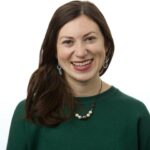Q&A: Allison Aaron, MS, CCC-SLP from the STEPP Lab
 Allison is a doctoral student in the Speech, Language, and Hearing Sciences Department at Sargent College, and works in the STEPP Lab for Sensorimotor Rehabilitation Engineering. She works primarily with transgender voice therapy.
Allison is a doctoral student in the Speech, Language, and Hearing Sciences Department at Sargent College, and works in the STEPP Lab for Sensorimotor Rehabilitation Engineering. She works primarily with transgender voice therapy.
She was interviewed by Lauren Tropio, a student in our MS in Speech-Language Pathology program.
LT: Can you tell us about what you are currently working on?
AA: We are studying the longitudinal effects of Testosterone (T) on the voice for trans and gender diverse (TGD) individuals. To do this, we are conducting an observational study to systematically test what changes, when changes occur, and what might predict changes in TGD assigned female at birth (AFAB) adults who are being treated with T as part of their normal clinical care over the course of year 1 of treatment. We are looking at anatomical (MR imaging), physiological (stroboscopy, aerodynamics), acoustical, and perceptual changes across time (once per month), to provide baseline information about vocal function and allow for evidence-based voice care for this population.
LT: How did you get into this field? Was there something that drew you to work with transgender therapy?
AA: As a lifelong singer and a voice-specialized speech language pathologist, I have found myself constantly curious about the voice and the way that we can shape and change our vocal behaviors. Over the past two years, I have learned about the heightened health risks and high prevalence of speech-gender incongruence for trans and gender diverse (TGD) speakers, and I have grown passionate about the need for gender-affirming communication voice research.
LT: In light of June, if there is anything you wish you could tell the BU community?
AA: This research is needed to inform clinical care so that TGD individuals can use their voices not just efficiently and effectively, but also safely for them. As a cisgender ally, the safety component was not something I initially realized, but is now constantly motivating me to do this work.
LT: Do you have plans after your degree to continue working with this kind of therapy?
AA: I hope to continue working to promote evidence-based gender-affirming voice care for TGD individuals.
LT: How has it been working in the Stepp Lab? Is there anything worth highlighting that your colleagues are working on?
AA: We currently have many ongoing studies, and we are looking for volunteers to participate. Some studies are specifically for TGD individuals, some are for any speakers with typical voices, and some are for speakers with voice disorders. If you are interested in participating in our studies and/or want to follow our work, please check out our website and subscribe to our newsletter.
Thank you for all you do, Allison – we can’t wait to see the achievements and advancements the STEPP Lab will bring.